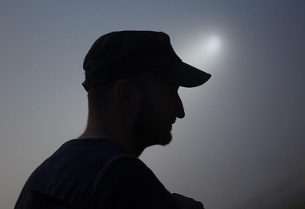
5 Minutes with… Sam Brown

For many directors, commercials are just a stepping-stone towards something else, but for Sam Brown the key to making brilliant ads lies in having a passion for them. This year he’s directed the Waitrose holiday ad – and there’s a lot of love in the tale of a brave little robin making his way home for Christmas. From the stirring strings to the detailed CG of the determined hero, the careful details show a director who is so totally absorbed in what he does. And it’s not the only festive spot featuring Sam’s handiwork out this year – he’s also been literally herding cats for pet food brand Temptations.
Sam’s work in commercials spans everything from historical epic (Horse Story for Lloyds), stylised neon pop (Guinness Black) and detailed animation (Set Yourself Free for Freeview) – but he’s also keen to re-visit the world of music video, where he first got his break.
LBB’s Laura Swinton caught up with him just as he got ready to unleash Waitrose on the world...
LBB> What was it about the script for the Waitrose Christmas ad that appealed to you?
SB> The story is about the migration of a robin, but we wanted to think of it in terms of a homecoming. Travelling back home for Christmas is something most of us do, almost instinctually. So the bird's story is really a human story.
LBB> This is Waitrose’s first big Christmas ad – but their sister brand John Lewis is the standard bearer when it comes to huge Christmas campaigns in the UK. Did that add any pressure in and of itself?
SB> No more than any other job, I don't think... although there was obviously a greater emphasis on finding our own tone of voice.
Having said this, I do see the John Lewis phenomenon as a resounding positive for everyone. They're the standard bearer because they're really, really good and people love them. It's got the viewing public talking about advertising again, which seems to be inspiring brands to do big emotive storytelling.
LBB> What was the production itself like? Any stand out memories from the shoot?
SB> It was wonderful. Crouching in a freezing stream with Steven Keith Roach waiting for a falcon to appear from the trees was a particularly vivid memory. I remember feeling very jealous of his Afghan wool hat.
LBB> It’s a really emotional story but that never feels saccharine; as a director how do you walk that line between building a powerful emotional story without laying it on thick?
SB> I'm not sure the viewer minds emotions being laid on thick, I think they only begin to feel manipulated when those emotions don't ring true. Audiences are sophisticated: they can sniff out bullshit pretty quickly and separate real emotions from phony ones. The key is to make good decisions in production, and get this right.
LBB> And are there any elements or aspects of the film that you’re particularly excited about?
SB> I'm really excited about having realised a character entirely in CG. It's something I've shied away from previously, but loved doing on this job. I think what The Mill have done is remarkable. The level of skill involved in making a convincing CG character is awe inspiring, because you have to build the animal from the skeleton outwards, like a living breathing thing. I've always found the process, and the people who do it, extraordinary.
LBB> You got your break as a director when you were working at Flynn Productions back in the day – it wasn’t necessarily something you trained for… what were the benefits of learning on the job and finding your own way through?
SB> I really believe that the only meaningful things that can be learned about filmmaking come from trying to make films. It's highly likely that the imperfections in your process will become the things that will eventually make your work distinct from everyone else’s. Nobody else can, or should, tell you how to do it.
In terms of finding my way through: one thing I was very conscious of from an early stage was trying to build my own interest from the ground up. I never allowed myself to sit on a roster and wait for scraps to fall down from bigger directors. I insisted on only doing stuff that came in for me, no matter how piddling.
LBB> One of the big turning points in your career as a director was when you made the James Blunt video ‘You’re Beautiful’, which re-launched both the song and artist to worldwide acclaim. As I understand it, the ubiquity of the song and video was quite troubling (or maybe annoying?) Was it really that bad? Did it make you rethink how you chose which jobs you wanted to work on?
SB> Sure, it haunted me for a while! But I liked working with James and I'm still very proud of that video, in that it finally felt like I'd found a filmmaking voice of my own. It also came at a very important time for me, because I'd just had my first child and was about to give up directing altogether for a more stable career. The success of that job kept me going.
LBB> I remember back when you were directing music videos and it was a time when agencies still seemed to want to seek out cool up-and-coming promo directors and it was a bit of a badge of honour to hunt out ‘the next big thing’. It feels like that has changed quite a bit – what advice would you give young directors who have built up some cool music videos but are trying to make that leap into commercials?
SB> Music video budgets are so small now that I think it's (understandably) harder for agencies and clients to feel reassured that you can make an overnight leap of from a 15K video to a 750K commercial. Having said this, there are so many ways to get into commercial filmmaking now that aren't the standard 60-second TV spot. There are all sorts of very interesting, low-risk content that young directors can prove themselves on, that can then lead to bigger things.
In terms of advice I'd say only that young directors should be wary of getting into commercials just to make money, or as a bridge to other kinds of filmmaking. The industry will find you out pretty quickly. Get into it if you love watching great commercials, and want to make great ones yourself.
LBB> When you’re choosing which scripts/projects to work on, what do you look for?
SB> It's a cliché, but story and character are the only relevant things. Everything else is window dressing.
LBB> When you get a script in, how do you figure out how you want to approach it? Do you have a particular process or do you keep files or notebooks of ideas and references? Or do you like to approach each job as it comes?
SB> Normally an approach will come instantly and more-or-less whole, or it won't come at all. If I don't engage on a script, the reason is likely to be that I don't have a point of view on it. I think that's why agencies come to directors, because our point of view is basically the value that we bring to the process. We're there to invigorate it.
I don't tend to keep or reuse any ideas. I don't ingest an awful lot of creative stimulus. I read a lot but don't watch much.
LBB> Looking at your reel I really dig the variety – from emotional stories, historical epics, to really stylised spots like Made of Black. Is that variety important to you as a director?
SB> Yes, variety is important to me... but to be honest this tends to emerge naturally, because I like to completely reset on each commercial and approach it entirely on its own merits. If there are stylistic similarities between my jobs I see that as a failure, because that means I'm defaulting to certain ideas, tricks or techniques that I know will work rather than thinking about the particular needs of a project.
LBB> I really love your Freeview stuff with Electric Theatre Collective – the Left Behinds and Set Yourself Free. Is animation something you particularly enjoy?
SB> It's great, but very hard. Animation is a very particular skill, and I was very lucky in both cases to be working with gifted animators who held my hand throughout the process. I learned a lot from them. The hardest thing is that there are no mistakes in animation, whereas the normal filmmaking process is reliant on them: they're quite often the best bits.
LBB> Outside of directing, what do you like to get up to? What do you do to unwind?
SB> I get out to the country to walk and read. Not at the same time.
LBB> Who are your creative heroes and why? (Or hey, maybe you don’t have any?)
SB> I have many creative heroes in the industry who I won't embarrass by naming, but it's often directors or creatives I'm pitching against or for.
Outside of commercials I'm a huge fan of Roy Andersson. He makes these strange and astonishing films, entirely on his own terms and via an elaborately convoluted process. I really love that.
LBB> Is there any kind of project or film that you’re burning to direct that you haven’t had the chance to do before?
SB> No, I'm really happy doing what I'm doing. Commercials are a passion for me. Having said that, I haven't done a music video in a while, so I'd like to give that a whirl again at some point.













